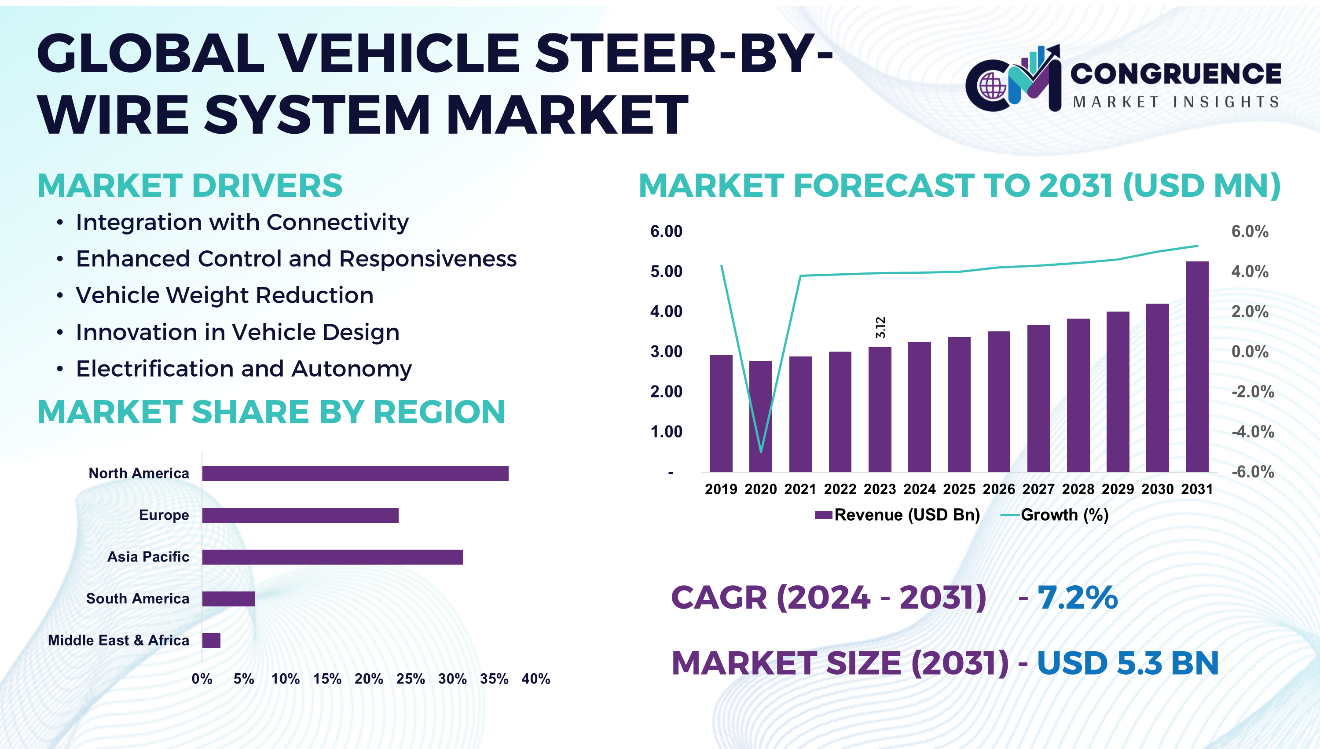Reports
The Global Vehicle Steer-by-wire System Market was valued at USD 3.1 Billion in 2023 and is anticipated to reach a value of USD 5.3 Billion by 2031 expanding at a CAGR of 7.2% between 2024 and 2031.
A Vehicle Steer-by-wire System is a quilted blanket that has a natural or artificial filling and is covered by a removable cover. The insert consists of a quilted shell with synthetic or natural fluff inside. In contrast to comforters, Vehicle Steer-by-wire Systems can be changed in style and feel at any time by replacing the cover. A Vehicle Steer-by-wire System set consists of a Vehicle Steer-by-wire System cover, a matching pair of pillow shams, and a Vehicle Steer-by-wire System insert. However, a Vehicle Steer-by-wire System cover set normally consists of the cover and coordinating linens, with the Vehicle Steer-by-wire System insert being offered separately. A typical Vehicle Steer-by-wire System filler generally includes wool, feathers, cotton, microfiber, polyester, and silk among others. The market is influenced by factors such as seasonal demand, trending designs in bedding, as well as the rising popularity of eco-friendly and hypoallergenic options. The Vehicle Steer-by-wire System market serves both residential customers and commercial establishments such as hotels and hospitality businesses.

To learn more about this report, request a free sample
copy
Vehicle Steer-by-wire System Market Major Driving Forces
Integration with Connectivity: Currently, mostly vehicles are becoming connected, steer-by-wire systems readily integrate into other vehicle systems and network communication. This enables real-time data exchange and remote diagnostics, enabling proactive maintenance and optimal utilization of vehicles.
Enhanced Control and Responsiveness: Steer-by-wire technology is more accurate and responsive in steering, compared to conventional mechanical solutions. This translates into a smoother driving experience and easier maneuvering, which appeals to drivers seeking higher performance for their vehicle.
Vehicle Weight Reduction: Steer-by-wire systems remove bulky mechanical devices; they contribute to the weight reduction of vehicles. Lighter vehicles enhance fuel efficiency and handling, which fits perfectly into industry shifting preferences towards greener and more efficient means of transportation.
Innovation in Vehicle Design: Steer-by-wire systems allow designers to rethink conventional steering schemes, allowing automakers to rethink how they set up the interior space of a vehicle. This flexibility opens up opportunities for designing more compact and modular vehicle architectures.
Electrification and Autonomy: As the automotive industry progresses towards electrification and autonomy, steer-by-wire technology supports the integration of sophisticated advanced driver-assistance systems (ADAS) and functions related to self-driving. These technologies require high-precision electronic control, such as in the case of lane-keeping and collision avoidance.
Vehicle Steer-by-wire System Market Key Opportunities
Improved Connectivity: With increased prevalence of connected vehicles, the steer-by-wire systems can make good use of this connectivity. Through seamless integration with other vehicle systems and communication networks, real-time data sharing and remote diagnostics can be accomplished, thus ensuring proactive maintenance and optimal vehicle performance. This connectivity strengthens operational efficiency and reliability.
Improved Control and Responsiveness: The steer-by-wire system provides an even higher level of precision and responsiveness in steering control compared to conventional mechanical systems. This enables a smoother driving experience and better maneuverability, allowing automakers to differentiate their vehicles based on enhanced performance attributes.
Optimization of Vehicle Weight: The use of steer-by-wire systems allows for the substitution of bulky mechanical components with lightweight electronic controls. Reduction in vehicle weight contributes to improved fuel efficiency and handling characteristics. On this basis, automakers can develop more sustainable and efficient transportation solutions that meet changing consumer expectations on eco-friendly cars.
Innovation in Vehicle Design: The steer-by-wire systems will enable innovation in vehicle design as the steering system becomes more flexible in the layout and positioning of steering components. This opens up potential for more compact and versatile vehicle architectures, which are increasingly required to accommodate the growing demands of electric and autonomous vehicles. On the other hand, automakers can take advantage of these new opportunities in design to advance the aesthetic looks of the vehicle, create maximal space utilization inside, and optimize the use of overall vehicle functionality.
Integration with Electrification and Autonomy: As the automotive industry advances toward electrification and autonomous vehicles, steer-by-wire technology will facilitate the integration of advanced driver-assistance systems and autonomous driving systems. These systems require precise electronic control in functions such as lane-keeping and collision avoidance. Automakers can take advantage of steer-by-wire technology to enable seamless integration of these advanced capabilities, thus enhancing vehicle safety and autonomy.
Vehicle Steer-by-wire System Market Key Trends
· The rising popularity for EVs is due to the technological advances, enabling regulations, and increased consumer concern toward environmental issues.
· Rapid development and deployment of autonomous vehicles with the help of rapid development in AI and sensor technologies are targeted toward enhanced safety and mobility.
· Integration with smart infrastructure and IoT devices will fasten the communication and navigation of vehicles with personalized services.
· Advanced Driver-Assistance Systems (ADAS) integration provides features such as lane-keeping aid and adaptive cruise control, making vehicles safer and more convenient to use.
· Vehicle-to-Everything (V2X) Communication will help in achieving safer and more efficient transportation networks with communication between vehicles, infrastructure, and pedestrians.
· Focus on carbon-neutral requirements will drive innovation in eco-friendly materials, recycling processes, and circular economy practices along the value chain.
· Transition to online sales, virtual showrooms, and contactless transactions is changing the way people purchase automobiles.
· Continuous efforts in improving fuel efficiency and reducing emissions will be made in lightweight materials, aerodynamics, and alternative power systems.
Region-wise Market Insights
North America accounted for the largest market share at 36.7% in 2023 whereas, Asia Pacific is expected to register the fastest growth, expanding at a CAGR of 7.4% between 2024 and 2031.

To learn more about this report, request a free sample
copy
North America, the growth of the GDP and employment rates indicate that consumers prefer SUVs, trucks, and electric vehicles, due to the growing sustainability initiatives and stringent regulations. Asia-Pacific's rapid growth in economies and disposable incomes attract demand for compact cars, hybrids, and electric vehicles based on urbanization and environmental concerns. Europe's stability and motives on sustainability guide the preference towards compact cars, luxury models, and electric vehicles based on strict emissions regulations and the adoption of urban congestion policies. Furthermore, south America's economic factors such as GDP growth and inflation affect consumer demand for compact cars and flexible fuel vehicles. The Middle East & Africa's economic diversification and fluctuations in the oil prices influence vehicle preferences, reaching from the mix of SUVs, luxury vehicles, and entry-level models.
Market Competition Landscape
Owing to the fierce competition among players in the vehicle steer-by-wire system market, the competition is extremely high. Companies are competing for the technological innovation and ultimately for the market dominance. The most effective drivers of competition are the electric control systems, the integration of safety features, and the development of adaptive steering technologies. Companies are trying to be reliable, responsive, and cost-effective while trying to meet the constantly evolving requirements of the customers. Companies are struggling with regulatory compliance, technical competencies, and supply chain management. The partnerships with automotive manufacturers, research institutions, and technology providers play a crucial role in market penetration and product differentiation. It is all in this competitive environment with the continuous innovation and cooperation within the automotive sector.
Key players in the global Vehicle Steer-by-wire System market implement various organic and inorganic strategies to strengthen and improve their market positioning. Prominent players in the market include:
· Robert Bosch GmbH
· Nexteer Automotive
· ZF Friedrichshafen AG
· thyssenkrupp AG
· JTEKT NORTH AMERICA
· NSK Ltd.
· Schaeffler AG
· LORD Corporation
· ContiTech Deutschland GmbH
· Schaeffler AG
· PARAVAN GmbH
· SKF
· Hitachi Astemo, Ltd.
· HL Mando Corp.
· KYB Corporation
|
Report Attribute/Metric |
Details |
|
Market Revenue in 2023 |
USD 3.1.0 Billion |
|
Market Revenue in 2031 |
USD 5.3 Billion |
|
CAGR (2024 – 2031) |
7.2% |
|
Base Year |
2023 |
|
Forecast Period |
2024 – 2031 |
|
Historical Data |
2019 to 2023 |
|
Forecast Unit |
Value (US$ Bn) |
|
Key Report Deliverable |
Revenue Forecast, Growth Trends, Market Dynamics, Segmental Overview, Regional and Country-wise Analysis, Competition Landscape |
|
Segments Covered |
· By Component Type (Steering Actuator, Sensor, Control Module, and Others) · By Vehicle Type (Passenger Cars, and Commercial Vehicles) · By Technology (Electrically Assisted Steering (EAS), Electro-Hydraulic Steering (EHS), and Fully Electric Steering (FES)) · By End-User (OEMs, and Aftermarket) |
|
Geographies Covered |
North America: U.S., Canada and Mexico Europe: Germany, France, U.K., Italy, Spain, and Rest of Europe Asia Pacific: China, India, Japan, South Korea, Southeast Asia, and Rest of Asia Pacific South America: Brazil, Argentina, and Rest of Latin America Middle East & Africa: GCC Countries, South Africa, and Rest of Middle East & Africa |
|
Key Players Analyzed |
Robert Bosch GmbH, Nexteer Automotive, ZF Friedrichshafen AG, thyssenkrupp AG, JTEKT NORTH AMERICA, NSK Ltd., Schaeffler AG, LORD Corporation, ContiTech Deutschland GmbH, Schaeffler AG, PARAVAN GmbH, SKF, Hitachi Astemo, Ltd., HL Mando Corp., and KYB Corporation |
|
Customization & Pricing |
Available on Request (10% Customization is Free) |
